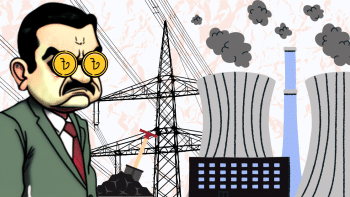How should Bangladesh deal with Adani’s $800m outstanding bill?

The controversy surrounding Adani's Godda power plant has spread in Bangladesh as well as abroad. The Adani Group has reportedly been requesting the interim government of Bangladesh to clear outstanding dues of around $800 million on their electricity sales. However, given the situation, I believe rather than terminating the Adani contract outright, the Bangladesh government should withhold the payment and commission international experts to conduct a thorough review of the highly controversial agreement with Adani. The current administration is under no obligation to honour agreements made by the ousted government that was elected through a questionable election.
Indian media outlets recently reported two notable stories: the Times of India revealed that Adani had written to Bangladesh Chief Adviser Prof Muhammad Yunus regarding the $800 million bill. Another report warned that Bangladesh faces an "unsustainable" $500 million power debt due to Adani's high electricity prices.
These developments underscore that the Bangladesh Power Development Board (BPDB) was unable to review the original contract with Adani. Under the directive of the authoritarian Hasina regime, the agreement was signed without review, likely to appease India. This pattern is not unprecedented. In the case of the Rampal coal-fired power plant, engineers from the German technology supplier for the project told me that initial drafts of agreements often contain inflated prices, which are typically subject to multiple rounds of negotiations. However, Bangladesh surprised them by signing the draft without any revisions. This incident is emblematic of how the Awami League government has consistently made agreements that went against Bangladesh's interests, contributing to a massive debt in the power sector.
The flaws in the Adani Godda power plant agreement have been widely documented in international media as well. Tim Buckley, a leading energy expert, told The Washington Post in 2022 that Bangladesh would pay over five times the country's average wholesale electricity price for power from Adani's plant. Even if coal prices revert to pre-Ukraine war levels, Bangladesh would still be paying 33 percent more for Adani's electricity compared to its domestic coal-based power plants. Buckley described this contract as "an absolute gouge" and questioned how any reasonable person could have signed such a detrimental deal on behalf of Bangladesh.
"And the plant may not even be needed: Bangladesh now has 40 percent more power generation capacity than peak demand, according to government figures, thanks to years of investment in coal- and gas-fired power stations… When compared with that of Bangladesh's Kaptai solar farm, Adani's power could be five times as expensive," Buckley said.
The Washington Post report said this power agreement initially appears to be "profitable for both Bangladesh and India," but in reality, it is "very less profitable" for Bangladesh.
Buckley further explained that even if the Godda power plant produces no electricity, Bangladesh would still owe Adani approximately $450 million annually as capacity and maintenance charges. This is considered an exceptionally high figure by global energy standards. A fresh report shows that Adani will receive annual capacity charges of $473.16 million for the power plant; in 25 years, about $11.83 billion will be spent on these charges.
In 2019, Australian Green Party MP Bob Brown launched a website called Adani Watch following protests over the controversial activities of Adani's various entities. On February 9, 2023, Adani Watch released a long report on the Godda power plant deal, which shows that under the current agreement, the price Bangladesh has to pay to buy electricity from Godda is almost three times higher than other power plants in India.
Adani has also reportedly exploited this agreement to inflate profits. Despite benefiting from tax exemptions in India, Adani continues to charge higher rates for the power supplied to Bangladesh, withholding information about these exemptions.
Adani has been exempted from duty and all kinds of taxes on coal import for the power plant. Also, the company does not have to pay any kind of Goods and Services Tax (GST), surcharge or any other duty-tax. According to sources, if the power plant runs at full capacity, it will require seven to nine million metric tonnes of coal annually. As a result, Adani is getting $200 million in duty-tax exemption only on coal imports.
According to the information, Adani was supposed to pay 12.5 percent custom duty and excise duty on power plant equipment, 15 percent service tax on construction works, two percent central sales tax on purchase of goods from outside Jharkhand, 15 percent composite tax on 40 percent of the contractor's bills, 5.5 percent VAT, one percent welfare tax for construction workers, four percent contract tax, water consumption charges, and income tax to the state government of Jharkhand. But these duties and taxes have been waived. However, Adani is not giving any concession to Bangladesh in the sale of electricity.
According to Adani Watch, India's union government charges 400 rupees ($4.88) as Clean Energy Cess (a form of carbon tax) for every tonne of coal. According to the final Environmental Impact Assessment filed by APL to the Ministry of Environment, the plant will consume anywhere between seven and nine million tonnes of coal annually for its proposed PPA period of 25 years. If the figure is taken at eight million tonnes per annum, a back-of-the-envelope calculation produces an estimate that APL will save $39.02 million per year on the Clean Energy Cess and nearly $1 billion over 25 years, by virtue of being declared an SEZ. Being in an SEZ, Adani Power (Jharkhand) Ltd will get 100 percent income tax exemption for the first five years, 50 percent for next five years thereafter, and 50 percent of the ploughed back export profit for next five years.
Adani is also accused of price manipulation by purchasing low-grade coal while charging Bangladesh for high-grade prices, as the Financial Times reported. This has led to Bangladesh paying at least 30 percent above the international market rates. According to a 2018 IEEFA report, the country will have to spend an additional Tk 70,000 crore over 25 years to buy power from Adani Group.
Given the overwhelming evidence that this contract is detrimental to Bangladesh, I believe it is imperative that the agreement be reviewed rather than immediately cancelled. There is no justification for taking out new foreign loans to pay Adani in full under the current terms. Instead, at most, 25 percent of the outstanding bills should be settled while the review process is underway.
However, if Gautam Adani refuses to renegotiate the terms of the contract, Bangladesh may need to consider political action to terminate the agreement.
This approach is supported by critics within India itself, where opposition leader Rahul Gandhi questioned the contract in parliament, citing the close relationship between Prime Minister Modi's foreign policy and his favouritism toward Adani. Gandhi pointed out that Adani secured the 1,500MW contract shortly after Modi's visit to Bangladesh.
Prominent Indian intellectuals have also criticised the deal, with Paranjoy Guha Thakurta stating that Adani's Godda contract has "pushed Bangladesh into a ditch." Al Jazeera reported on the growing international concern, describing Bangladesh as being in the "hot seat" over the Adani power deal.
The existing evidence suggests that Bangladesh has valid grounds to demand a review of the Adani contract. The government must show resolve in protecting national interests, with no reason to fear repercussions for standing firm on an unfair agreement.
Faiz Ahmad Taiyeb writes on sustainable development and is a public policy critic.
Views expressed in this article are the author's own.
Follow The Daily Star Opinion on Facebook for the latest opinions, commentaries and analyses by experts and professionals. To contribute your article or letter to The Daily Star Opinion, see our guidelines for submission.

 For all latest news, follow The Daily Star's Google News channel.
For all latest news, follow The Daily Star's Google News channel. 












Comments